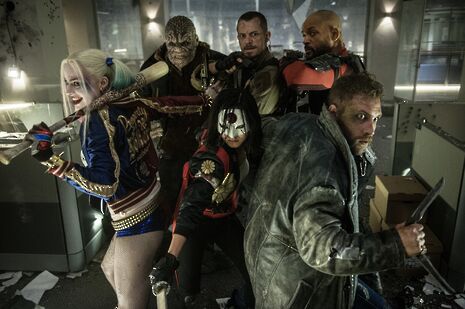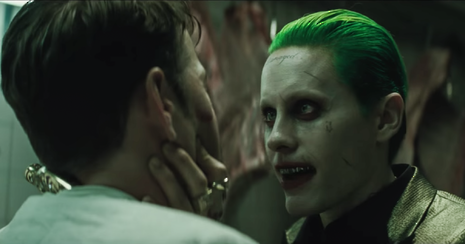Film: Suicide Squad
DC’s latest instalment struggles to find a convincing voice – losing out on character, action and plot

DC Comics’ latest effort to extend their ‘cinematic universe’ to Marvel-rivalling bounds comes in the form of David Ayers’ Suicide Squad, in which we see a band of supervillains forced together in order to prove unlikely heroes.
Unfortunately, the premise itself is where things begin to fall apart. The nature of a band of supervillains is, and this really goes without saying, that saving the day really isn’t in their DNA. Supposedly lacking the sense of decency that drives the gang of scoundrels in Marvel’s Guardians of the Galaxy to live up to their billing, the titular Suicide Squad at first has to be compelled to go against their inherent villainy – under pain of death. As the film progresses, a tale of redemption is supposed to emerge, the villains atoning for their heinous crimes by using their powers for good.
With this in mind, the failure of Suicide Squad is simple – the film both does not manage to convince the audience that its characters are the debased people it tells them they are, and then does very little to develop redemption narratives for these characters.
The ceaselessly charismatic Will Smith feels miscast as Deadshot. A deadly sharpshooter, if Deadshot was the villain we’re told he is he would stir unease and grudging admiration, seeing as he’s capable of doing extraordinary damage in the blink of an eye and only the threat of execution ensures he won’t inflict that damage. However, Smith’s easy charm and his character’s relationship with his estranged daughter means that his super(anti-)hero character in Hancock was more convincing as a morally-reprehensible ‘bad guy’.
However, the tough balancing act that the film demands does not go universally unaccomplished. Jay Hernandez’s Diablo is given the courtesy of being furnished with a backstory that is both believable and even touching, and Margot Robbie’s Harley is a similar success. More lurid and interesting a character than the tortured, fiery-tempered Diablo, Quinn’s backstory and ostensible tender side, as well as Robbie’s menacingly sweet performance, are enough to sell her redemption narrative.
As much as its successes are laudable, Suicide Squad’s more glaring and baffling character botchings are truly bizarre. Killer Croc and Katana, played by Adewale Akinnuoye-Agbaje and Karen Fukuhara respectively, are so devoid of development that even judging whether they fit into what the film is trying to achieve is impossible.
The inadequacies of many of the central characters aren’t helped by the fact that over this band of rogues looms the shadow of one of cinema’s most iconic villains – the Joker.

While Jared Leto’s Joker is by no means bad, he simply doesn’t live up to the hype. Despite all the leaks about the aesthetic of Leto’s character, and the buzz about his odd preparation for the role, he becomes little more than an accessory to Suicide Squad. For all the whispered fanfare, this more garish incarnation could’ve been met with excitement. As it is, his interventions are less a surprise treat for audiences, and more like ripping back snowflake-spangled Christmas wrapping-paper to reveal socks in various shades of grey.
For all its character flaws, the film itself could have been redeemed had its action sequences packed more of a punch. Instead almost all of the film’s violence is staged in near darkness, often with the added impediment of heavy rain. The atmospheric effect intended may have been achieved were it not the dizzying rate of shot changes in these sequences. On the spectrum of action films that shoot their action chaotically, Suicide Squad veers sharply in the opposite direction to the impressive Bourne franchise and crashes headlong into impossible-to-watch side of the scale.
The most natural comparisons to make across the Marvel/DC divide would be with Avengers Assemble (2012) and Guardians of the Galaxy (2014), something Suicide Squad seems to know. And so, with a chip the size of two summer blockbusters on its shoulder, the film lurches its way to a scenario where the world is at stake, but for reasons that aren’t really explained.
As there was with DC Comics’ last offering, Batman v. Superman: Dawn of Justice, the conventional wisdom that has sprung up around Suicide Squad is that while critics tut, roll their eyes, and shake their heads, fans love what they’re seeing. That may be so, but for Warner Bros. Pictures to think that they’re tapping into some kind of cinematic populism would be wilfully delusional.
The stark divide between fans and critics is likely testament to DC fans’ dedication and attachment to the characters and stories being brought to the screen. Before many had the chance to see Suicide Squad, and adjudicate whether the critics had been fair in their initial assessment, they were petitioning to have the review aggregator, Rotten Tomatoes, shut down. That level of misplaced faith from its fan base honestly makes the studio more damnable for the tawdriness of Suicide Squad.
Suicide Squad has a lot of punches to throw. Sadly, without any pugilistic deftness, the film is a welter of flailing limbs, and every would-be blow fails to land.
 News / SU reluctantly registers controversial women’s soc18 December 2025
News / SU reluctantly registers controversial women’s soc18 December 2025 News / CUP announces funding scheme for under-represented academics19 December 2025
News / CUP announces funding scheme for under-represented academics19 December 2025 Features / Should I stay or should I go? Cambridge students and alumni reflect on how their memories stay with them15 December 2025
Features / Should I stay or should I go? Cambridge students and alumni reflect on how their memories stay with them15 December 2025 Fashion / The art of the formal outfit 18 December 2025
Fashion / The art of the formal outfit 18 December 2025 Lifestyle / Summer lovin’ had me so… lonely?18 December 2025
Lifestyle / Summer lovin’ had me so… lonely?18 December 2025








